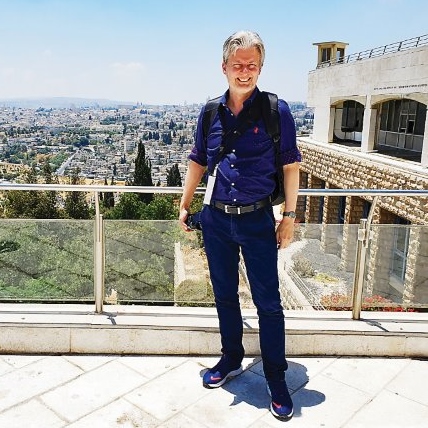SA
Israel offers economic lessons for SA, says academic
Philippe Burger, professor of economics at a top South African university, recently returned from a trip to Israel believing that interaction between Israeli and South African academics is worthwhile.

TALI FEINBERG
“Israel presents an example of how a country reinvented itself economically. It shows what’s possible,” he says.
“South African academics can learn from their Israeli counterparts how a country can re-imagine its economy. Taking a struggling economy in the 1970s and 1980s, reinventing the role of the government in the economy, and laying the foundation for a fast-growing entrepreneurial economy contains a few lessons. That is, especially given the economic challenges that South Africa faces. For that, interaction between South African and Israeli academics will be worthwhile.”
This is Burger’s first trip to Israel. He travelled with a group of academics and their tour was sponsored by the South African Friends of the Hebrew University.
Burger was a Fulbright Exchange Scholar at the Center for Sustainable Development, Earth Institute, at Columbia University. There, he wrote a book on South Africa’s low growth and high unemployment problem titled, Getting it right: a new economy for South Africa, so he knows what he’s talking about when he sees an economic model that works. He suggests Israel can offer an example of how to revive South Africa’s economy.
He believes South African academics should visit Israel for other reasons too. “Being an academic is all about exchanging ideas. If you don’t interact, there is limited exposure to alternative views. South Africa as a society has overcome huge political, social, and racial divisions, and the job is still unfinished. We can expose people in other societies characterised by conflict to the possibility of creating a different, peaceful, and common narrative among different groups, a narrative that recognises the humanity of all. Such a common narrative will be necessary to ensure peaceful co-existence in a two-state solution.
“The South African group that visited Israel was, in fact, a good example of the different narrative that we constructed in the South African context. We come from different communities, but we interact as human beings, seeing our diversity as a strength. We can expose others to how we overcome the divisions of the past while building a better future. If our South African story – even as a side effect of exchanging ideas on technology and science – can inspire people across communities in Israeli society to interact more and get to know each other on a human level, the interaction between South African and Israeli academics will be worthwhile,” he says.
On a more personal note, he chose to go on the trip as he was aware that Israel is on the cutting edge of technological development, and is known for its start-up culture. Also, from childhood, he has loved history, and finds Jewish, Israeli, and Middle-Eastern history fascinating.
What he found most surprising was the central role the Israeli Defense Forces plays in developing Israeli technology, with many young people picking up the skills and independence they need to create start-ups from the army. “Also, even though I had read about it, I was quite surprised by the extent of the start-up culture, and how key it is to the Israeli economy.”
He was very aware of the divide between Israeli and Palestinian society in the West Bank and Gaza, and was also “quite surprised by the size of the social divide between the Jewish and Arab-Israeli communities in Israel itself. The impression I got was of communities largely living in parallel, not even interacting much in the workplace.”
He enjoyed interacting with Israeli academics. “As an academic, I love exchanging ideas. I found the almost radical interdisciplinary approach quite refreshing. For instance, the fact that groups of engineering, design, and business students have to work together to create viable products is worth emulating. The competitiveness – even at university level – between groups of students who have to create such products, and the sharp focus on the job at hand, is also worth exploring as ways to enhance learning.”
He was disappointed that most of these academics didn’t offer solutions for the resolution of conflict in the region. “Based on the admittedly limited exposure one can gain in five days, I got the impression that because Israel is under constant threat, it might make it difficult for even Israeli academics to conceive of a normal future where all communities live in harmony. Probing them on how the country can move to a viable and stable political settlement that will bring peace usually brought little more than acknowledgement of the current political impasse, and an expression of hope that the impasse will be overcome by fresh leadership in future.”
The highlight of his trip was the Orcam MyEye demonstration. This is a tiny camera which can be attached to any pair of glasses, and increases the independence of people who are blind and visually impaired. It can read texts, recognise faces, identify products, money notes, and colours, and tell the user the time and date, by conveying visual information audibly.
Burger also enjoyed his visit to the Peres Center for Peace, and learning about water and solar industries in Israel. “I’m a bit of a tech junkie, so I found all the amazing technological developments interesting,” he says. “I stayed on in Israel for a few days after the tour, visiting Tel Aviv and Jerusalem. Tel Aviv is an amazing, beautiful, and modern city.”
*Burger asked that his university not be named as these are his personal views and not those of the university.